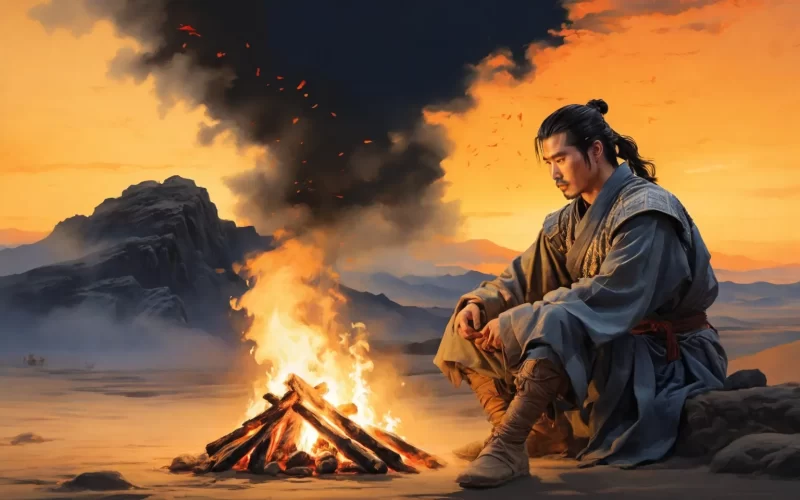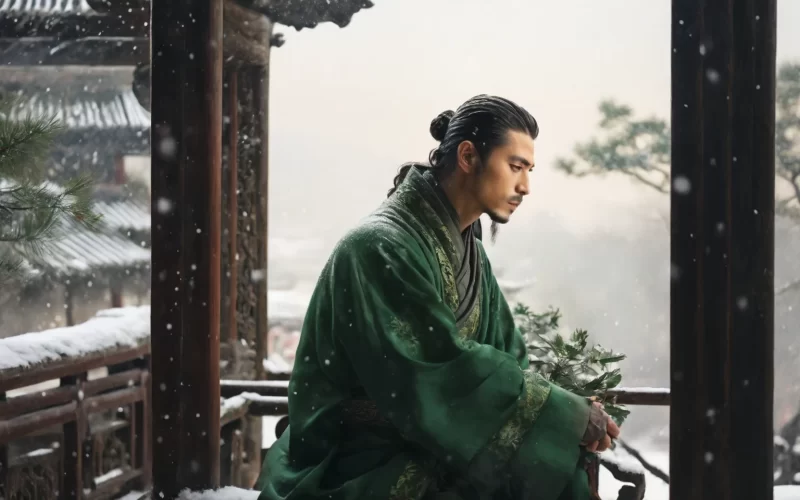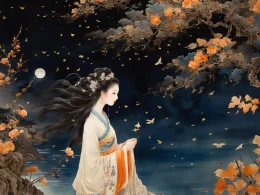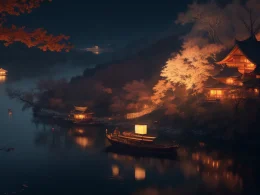Through the bright day up the mountain, we scan the sky for a war-torch ;
At yellow dusk we water our horses in the boundary-river;
And when the throb of watch-drums hangs in the sandy wind,
We hear the guitar of the Chinese Princess telling her endless woe…
Three thousand miles without a town, nothing but camps,
Till the heavy sky joins the wide desert in snow.
With their plaintive calls, barbarian wildgeese fly from night to night,
And children of the Tartars have many tears to shed;
But we hear that the Jade Pass is still under siege,
And soon we stake our lives upon our light war-chariots.
Each year we bury in the desert bones unnumbered,
Yet we only watch for grape-vines coming into China.
Original Poem
「古从军行」
李颀
白日登山望烽火,黄昏饮马傍交河。
行人刁斗风沙暗,公主琵琶幽怨多。
野营万里无城郭,雨雪纷纷连大漠。
胡雁哀鸣夜夜飞,胡儿眼泪双双落。
闻道玉门犹被遮,应将性命逐轻车。
年年战骨埋荒外,空见蒲桃入汉家。
Interpretation
This Tang dynasty poem by Li Qi adopts a soldier's perspective to depict the harsh realities of frontier warfare, exposing war's cruelty and garrison troops' desolation. While most Tang frontier poetry glorified military heroism, this work's anti-war stance makes it uniquely valuable, offering implicit criticism of imperial militarism.
First Couplet: "白日登山望烽火,黄昏饮马傍交河。"
Bái rì dēng shān wàng fēng huǒ, huáng hūn yìn mǎ bàng Jiāo Hé.
At dawn we climb hills to watch beacon fires, At dusk we water horses by Jiao River's mires.
The opening establishes soldiers' daily routine: daytime surveillance of border signals, evening respite by the river. The dawn-to-dusk progression underscores their ceaseless vigilance and the ever-present threat of attack.
Second Couplet: "行人刁斗风沙暗,公主琵琶幽怨多。"
Xíng rén diāo dǒu fēng shā àn, gōng zhǔ pí pá yōu yuàn duō.
Travelers' gongs dim in sandstorms dire, A princess's pipa sings grief that makes hearts tire.
Juxtaposing soldiers' warning gongs (刁斗) with a tributary princess's mournful lute (琵琶), this couplet connects military hardship with diplomatic sorrow. The metallic gongs cutting through dusty winds mirror the pipa's plaintive tones, blending martial and musical melancholy.
Third Couplet: "野营万里无城郭,雨雪纷纷连大漠。"
Yě yíng wàn lǐ wú chéng guō, yǔ xuě fēn fēn lián dà mò.
Wild camps stretch endlessly—no town in sight, Rain and snow merge with the desert's might.
Vast wilderness and tempestuous weather emphasize the troops' isolation. "No town" underscores their exposure to danger, while the merging precipitation symbolizes nature's indifference to human suffering.
Fourth Couplet: "胡雁哀鸣夜夜飞,胡儿眼泪双双落。"
Hú yàn āi míng yè yè fēi, hú ér yǎn lèi shuāng shuāng luò.
Nomadic geese wail through the night, While Tartar children's tears fall in pairs from plight.
The wailing geese (traditionally carriers of frontier sorrow) and weeping local children universalize war's trauma, showing how conflict transcends ethnic boundaries to harm all.
Fifth Couplet: "闻道玉门犹被遮,应将性命逐轻车。"
Wén dào Yùmén yóu bèi zhē, yīng jiāng xìngmìng zhú qīng chē.
Jade Gate remains blocked, we're told, Our lives spent chasing chariots bold.
The sealed Jade Pass (玉门) symbolizes endless conflict, while "chasing chariots" reduces soldiers to expendable pawns in perpetual warfare.
Sixth Couplet: "年年战骨埋荒外,空见蒲桃入汉家。"
Nián nián zhàn gǔ mái huāng wài, kōng jiàn pútáo rù Hàn jiā.
Year after year bones bleach where battles roar, While Han palaces import grapes—nothing more.
The devastating contrast between mass graves and imported grapes (蒲桃) delivers the poem's anti-war climax: human lives sacrificed for trivial luxuries.
Comprehensive Analysis
Progressing from daily hardship to existential critique, the poem masterfully layers imagery (beacons, storms, geese) with historical resonance (Jade Pass, Han tribute). Its unflinching depiction of war's futility—where neither victory nor spoils justify the cost—transcends its Tang context to speak universally.
Artistic Innovations
- Cinematic progression: Each couplet advances from observation to condemnation like a tracking shot across the battlefield.
- Cross-cultural empathy: Tartar children's tears challenge Sino-centric narratives of frontier glory.
- Subversive materialism: The grapes symbolize war's hollow economic motivations centuries before modern anti-war poetry.
Insights
Beyond criticizing Tang militarism, the poem deconstructs war's very logic. Its closing image—bones for grapes—prefigures Bertolt Brecht's "What is the robbing of a bank compared to the founding of a bank?" by a millennium, reminding us that the calculus of war rarely benefits those who fight it. The geese's cries and children's tears form an eternal chorus against the folly of armed conflict.
Poem translator
Kiang Kanghu
About the Poet
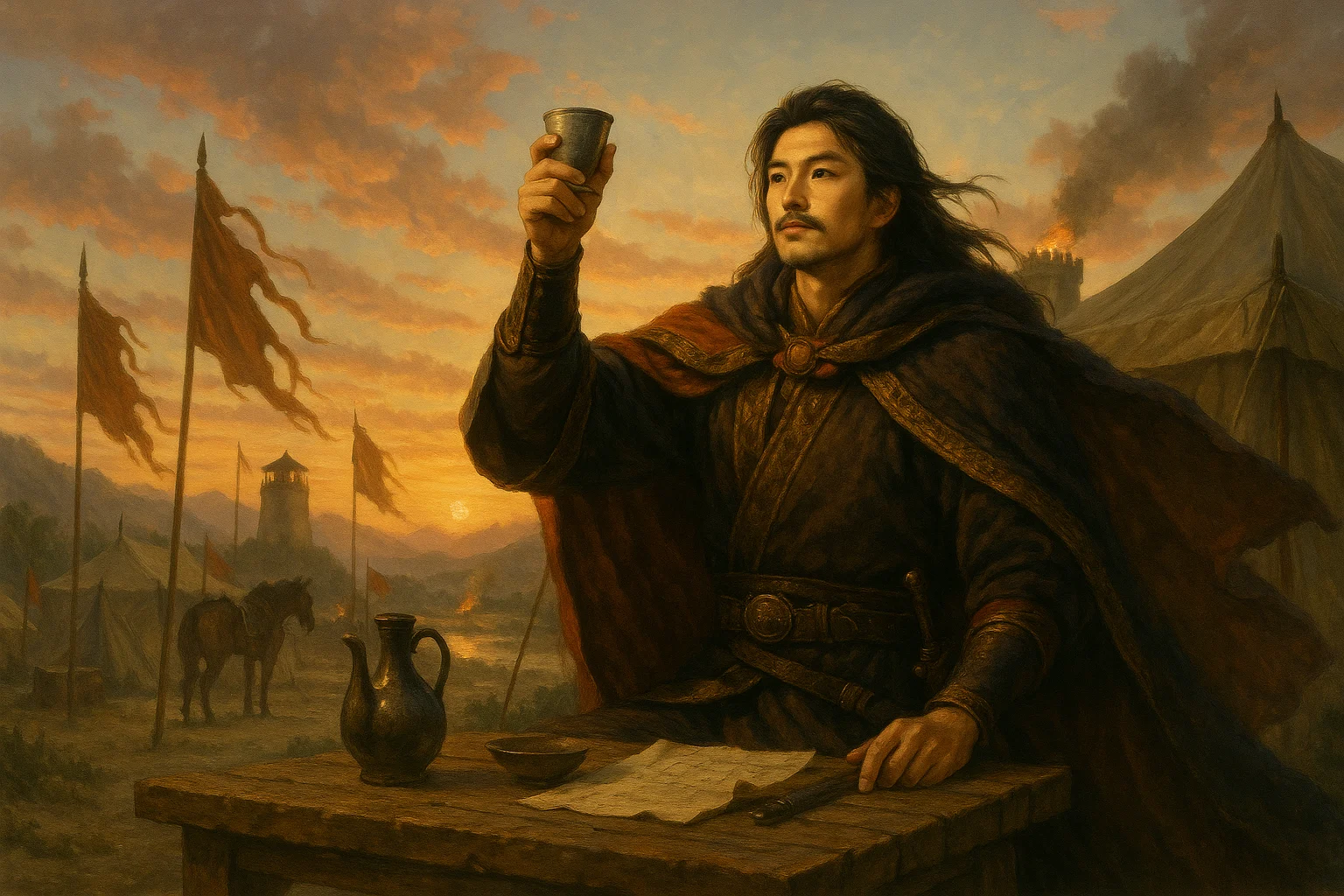
Li Qi (c. 690 - 753 AD) . A renowned Tang dynasty poet, Li Qi traced his ancestral roots to Zhao Commandery (present-day Zhao County, Hebei) but resided primarily in Yingyang (modern Dengfeng, Henan). Li Qi excelled in five- and seven-character verse forms, particularly frontier poems and musical poetry. He maintained close friendships with literary giants like Wang Wei, Gao Shi, and Wang Changling, later being grouped with them as one of the "Four Masters of High Tang" (Gao, Cen, Wang, and Li).






